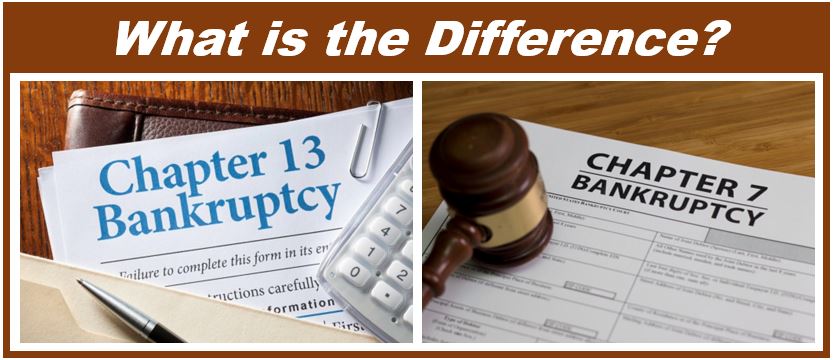Managing personal finances over the past few decades has continued to become more difficult for many people across the country. While costs of housing, healthcare, education, and key living expenses continue to increase, compensation has not kept up. This has made it challenging for those to pay their bills and stay out of debt. For those that are in a lot of debt, the most effective way to get out of it could be to file for bankruptcy.
When you are going to file for bankruptcy, the two main options are to file chapter 7 or chapter 13 bankruptcy. In general, a Chapter 7 bankruptcy is considered a full liquidation while Chapter 13 is a personal reorganization of debts. If you are considering filing for bankruptcy, understanding the differences between these two options is very important as they can make one option a better decision for you based on your situation.

Eligibility Requirements
There are certain eligibility requirements that need to be met when you are going to file for bankruptcy. For those who want to file Chapter 7, you can either be an individual or be a business. To qualify for this, you will need to pass the means test. This test is based on your income and the size of your household. The means test is used consistently across the country, but the income levels for the test will vary.
If you are not able to pass the means test when you want to file personal bankruptcy, the other option is to declare Chapter 13. To qualify for this, you will need to have less than $420,000 in unsecured debt. Further, this form of bankruptcy is only available to those who are individuals or structured as sole proprietors.
Impact on Debts
The main reason that people are going to file for bankruptcy is that they will want to have their personal debts eliminated, reduced, or restructured. When someone files for a Chapter 7 bankruptcy, they will typically have all of their qualifying personal debts eliminated. This typically will include credit cards and personal loans.
With a Chapter 13 bankruptcy, the focus will be more on restructuring your personal debts as opposed to eliminating them. This can include modifying your payment plans, consolidating debts, receiving interest rate relief, or payment deferrals for a period of time. Unsecured debts may be partially forgiven if you agree to a certain repayment plan.
Impact on Assets
The impact on your personal assets also varies considerably between Chapter 7 and Chapter 13. In most cases if you file Chapter 7 bankruptcy your personal assets will be liquidated. Any bank or investment accounts you have will be closed and the balances will be paid to your creditors. However, you will be able to retain some personal assets including a modest amount of vehicle equity, clothing, professional tools, and your retirement accounts.
When you are going to file Chapter 13 bankruptcy, you will likely get to keep all or most of your assets. If you have the liquidity to do so, you may be required to make a good faith payment towards your repayment plan. You may also be requested to sell certain valuables or other assets to pay down your debts. If you are looking to have unsecured debts forgiven, there may be more pressure to liquidate your assets to pay off the balances.
Speed of Process
The speed of a Chapter 7 bankruptcy is typically quick. Normally, from the time that you file to the time, it is finalized will be no more than 6 months. A Chapter 13 process will take much longer. Any discharged debts will typically not take place until you have completed the required repayment plan, which can take up to five years to finish.
Impact on Credit
One of the drawbacks to consider with either bankruptcy option is the impact it can have on your credit report and history. With a bankruptcy on your record, obtaining loans and credit can be challenging for a period of time. With a Chapter 7 filing, the bankruptcy will remain on your credit report for up to 10 years. With Chapter 13, it will only remain on your report for 7 years. However, despite the impact on your credit, bankruptcy can still be the best long-term solution for those that want to repair and rebuild their personal financial situation.
Filing bankruptcy can be a good financial option for anyone that has mounting debts and needs a fresh financial start. For those that are considering bankruptcy, having legal representation by your side is very important. An Indianapolis bankruptcy lawyer, such as Jerry E Smith, can provide a range of services that will help ensure the process goes smoothly. This will include providing consultation and helping you determine which bankruptcy option is best based on your situation. They can then help with all filing and negotiations with creditors to ensure the process goes smoothly, and you receive the best outcome possible.
Interesting related article: “What is a Creditor?“

